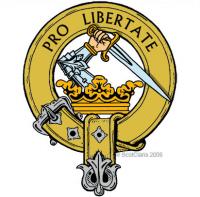
Clan Wallace
In old Latin documents the term Walensis is used to designate the Welsh, but in Scotland is more commonly used as a native name meaning a Strathclyde Briton and not, as is often thought, a Welshman coming in the train of the Norman French. It is from this Walensis that the name Wallace is derived.
The name of the clan Wallace is first found in records in the twelfth century as holding extensive lands around Ayrshire and Renfrewshire. Richard Walensis of Riccarton is hailed as the founder of the Wallace family.
The motto of the Wallace clan is "Pro Libertate - for liberty" and no member of the family encompasses that ideal more than the great Scottish patriot, Sir William Wallace of Elderslie. The Wallace clan had refused to submit to Edward I, and William led his family and fellow patriots in what was to be one of the earliest guerrilla campaigns in military history.
His military genius made him hated and feared by Edward I and he was known traditionally as "Guardian of Scotland". He was ultimately betrayed to the English and executed with great brutality.
The following centuries after Scotland’s battle for independence, the Wallace family continued to make a cultural and political mark on Scotland. The 15th century saw continuing skirmishes between the Scottish and the English, known as the Anglo-Scottish Border Wars. At the 1448 Battle of Sark, General John Wallace commanded men for what was a very decisive victory for the Scots over the 2nd Earl of Northumberland’s English forces.
The Wallaces inherited the Craigie estate from the Lindsays sometime in the 1600s after a Wallace married the heiress of Sir John Lindsay of Craigie. It is the Wallaces of Craigie that the senior branch of the clan is descended from.
During the occupation of the Clan Gordon Huntly Castle in 1640, Captain James Wallace served under General Robert Monro. Another Wallace of that time was the royalist Sir Hugh Wallace, who raised a regiment to fight against Cromwell’s army during the Civil War.
During the latter half of the 17th century Sir William Alexander of Menstreis tried to promote the Nova Scotia area as a Scottish colony by making a number of Scotland’s nobility a Baron of Nova Scotia, including Hugh Wallace of Craigie in 1669. Hugh was married to Esther Kerr, the daughter of the Laird of Little Dean. Unfortunately for the couple, their only son was brain damaged, and on the death of Sir Hugh, his brother’s grandson, the Rev. William Wallace of Falford became the second Baronet. The Rev. was a prominent and distinguished lawyer who rose to the position of Lord Justice Clerk, the second highest ranking judge in Scotland.
Sir Hew Wallace of Wolmet became the 4th Baronet after the 3rd, his brother, died leaving on a daughter.
The only son of the 5th Baronet, Sir Thomas Wallace, died young, and so his estates were passed down to his daughter, Frances. Frances married John Dunlop of Dunlop (a friend of Robert Burns) in 1760. Dunlop’s eldest son, Sir John, inherited the title and became the 6th Baronet of Craigie, and also assuming the name Wallace.
The Wallaces off Cairnhill, a cadet branch who had lived in Jamaica for a number of generations, became the chiefly line of the clan in the 19th century. That family, through marriage, inherited the Clancaird and Busbie estates in Ayrshire. Captain Henry Wallace of Busbie and Clancaird claimed the chieftainship to Clan Wallace in 1888. During the First World War, Robert Wallace of the Ilk was honored with both the Belgian and the French Croix de Guerre, and his son, Malcolm, rose to the rank of Colonel in the army, having served during the Second World War, Korea, and Borneo. His brother, Ian, succeeded him in 1991, becoming the clan’s 35th chief.








